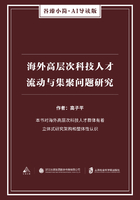A parlor car, toward a journey's end, is another excellent place to observe our native ways. Coming from Washington the other day my fellow-passengers began to show signs of restlessness near Newark. Books and papers were thrown aside; a general "uprising, unveiling" followed, accompanied by our objectionable custom of having our clothes brushed in each other's faces. By the time Jersey City appeared on the horizon, every man, woman, and child in that car was jammed, baggage in hand, into the stuffy little passage which precedes the entrance, swaying and staggering about while the train backed and delayed.
The explanation of this is quite ******. The "influence" was at work, preventing those people from acting like other civilized mortals, and remaining seated until their train had come to a standstill.
Being fresh from the "other side," and retaining some of my acquired calm, I sat in my chair! The surprise on the faces of the other passengers warned me, however, that it would not be safe to carry this pose too far. The porter, puzzled by the unaccustomed sight, touched me kindly on the shoulder, and asked if I "felt sick"! So now, to avoid all affectation of superiority, I struggled into my great-coat, regardless of eighty degrees temperature in the car, and meekly joined the standing army of martyrs, to hurry, scampering with them from the still-moving car to the boat, and on to the trolley before the craft had been moored to its landing pier.
In Paris, on taking an omnibus, you are given a number and the right to the first vacant seat. When the places in a "bus" are all occupied it receives no further occupants. Imagine a traction line attempting such a reform here! There would be a riot, and the conductors hanged to the nearest trolley-poles in an hour!
To prevent a citizen from crowding into an over-full vehicle, and stamping on its occupants in the process, would be to infringe one of his dearest privileges, not to mention his chance of riding free.
A small boy of my acquaintance tells me he rarely finds it necessary to pay in a New York car. The conductors are too hurried and too preoccupied pocketing their share of the receipts to keep count. "When he passes, I just look blank!" remarked the ingenious youth.
Of all the individuals, however, in the community, our idle class suffer the most acutely from lack of time, though, like Charles Lamb's gentleman, they have all there is.
From the moment a man of leisure, or his wife, wakens in the morning until they drop into a fitful slumber at night, their day is an agitated chase. No matter where or when you meet them, they are always on the wing.
"Am I late again?" gasped a thin little woman to me the other evening, as she hurried into the drawing-room, where she had kept her guests and dinner waiting. "I've been so driven all day, I'm a wreck!" A glance at her hatchet-faced husband revealed the fact that he, too, was chasing after a stray half-hour lost somewhere in his youth. His color and most of his hair had gone in its pursuit, while his hands had acquired a twitch, as though urging on a tired steed.
Go and ask that lady for a cup of tea at twilight; ten to one she will receive you with her hat on, explaining that she has not had time to take it off since breakfast. If she writes to you, her notes are signed, "In great haste," or "In a tearing hurry." She is out of her house by half-past eight on most mornings, yet when calling she sits on the edge of her chair, and assures you that she has not a moment to stay, "has only run in," etc.
Just what drives her so hard is a mystery, for beyond a vague charity meeting or two and some calls, she accomplishes little. Although wealthy and childless, with no cares and few worries, she succumbs to nervous prostration every two or three years, "from overwork."
Listen to a compatriot's account of his European trip! He will certainly tell you how short the ocean crossing was, giving hours and minutes with zest, as though he had got ahead of Father Time in a transaction. Then follows a list of the many countries seen during his tour.
I know a lady lying ill to-day because she would hurry herself and her children, in six weeks last summer, through a Continental tour that should have occupied three months. She had no particular reason for hurrying; indeed, she got ahead of her schedule, and had to wait in Paris for the steamer; a detail, however, that in no way diminished madame's pleasure in having done so much during her holiday. This same lady deplores lack of leisure hours, yet if she finds by her engagement book that there is a free week ahead, she will run to Washington or Lakewood, "for a change," or organize a party to Florida.
To realize how our upper ten scramble through existence, one must also contrast their fidgety way of feeding with the bovine calm in which a German absorbs his nourishment and the hours Italians can pass over their meals; an American dinner party affords us the opportunity.














